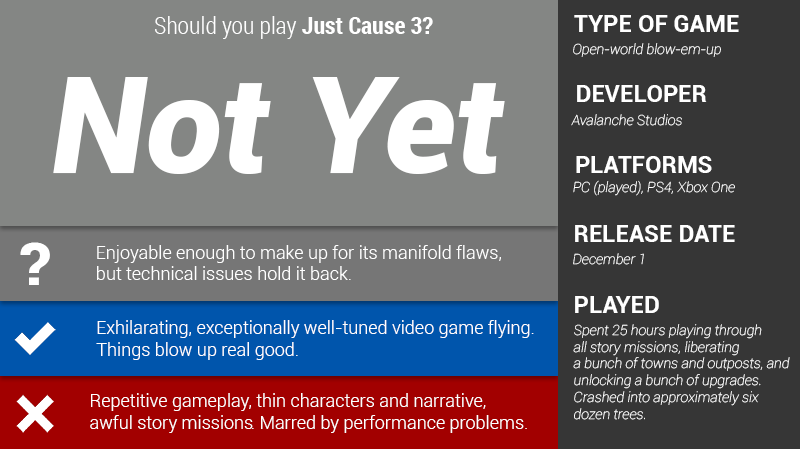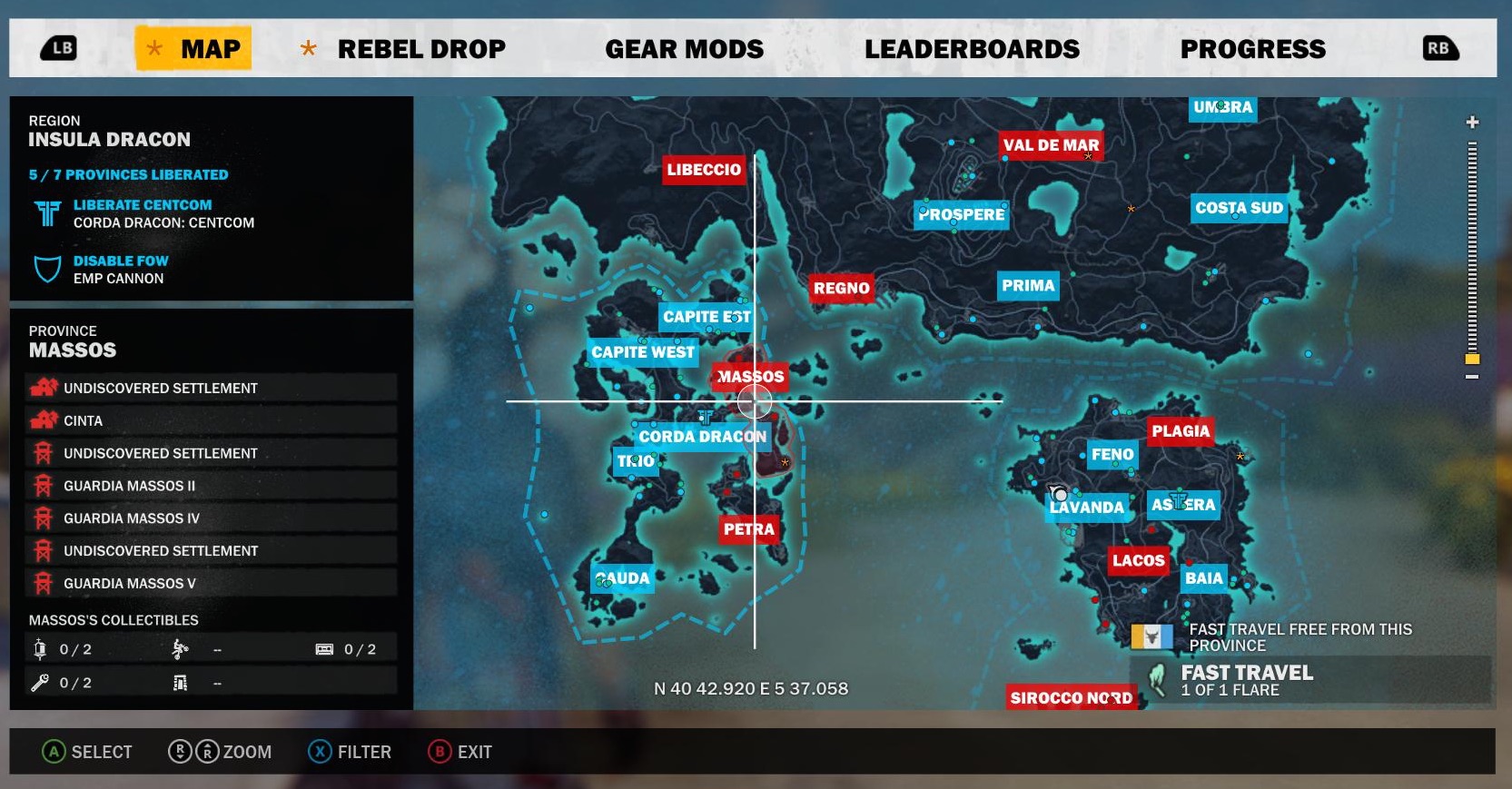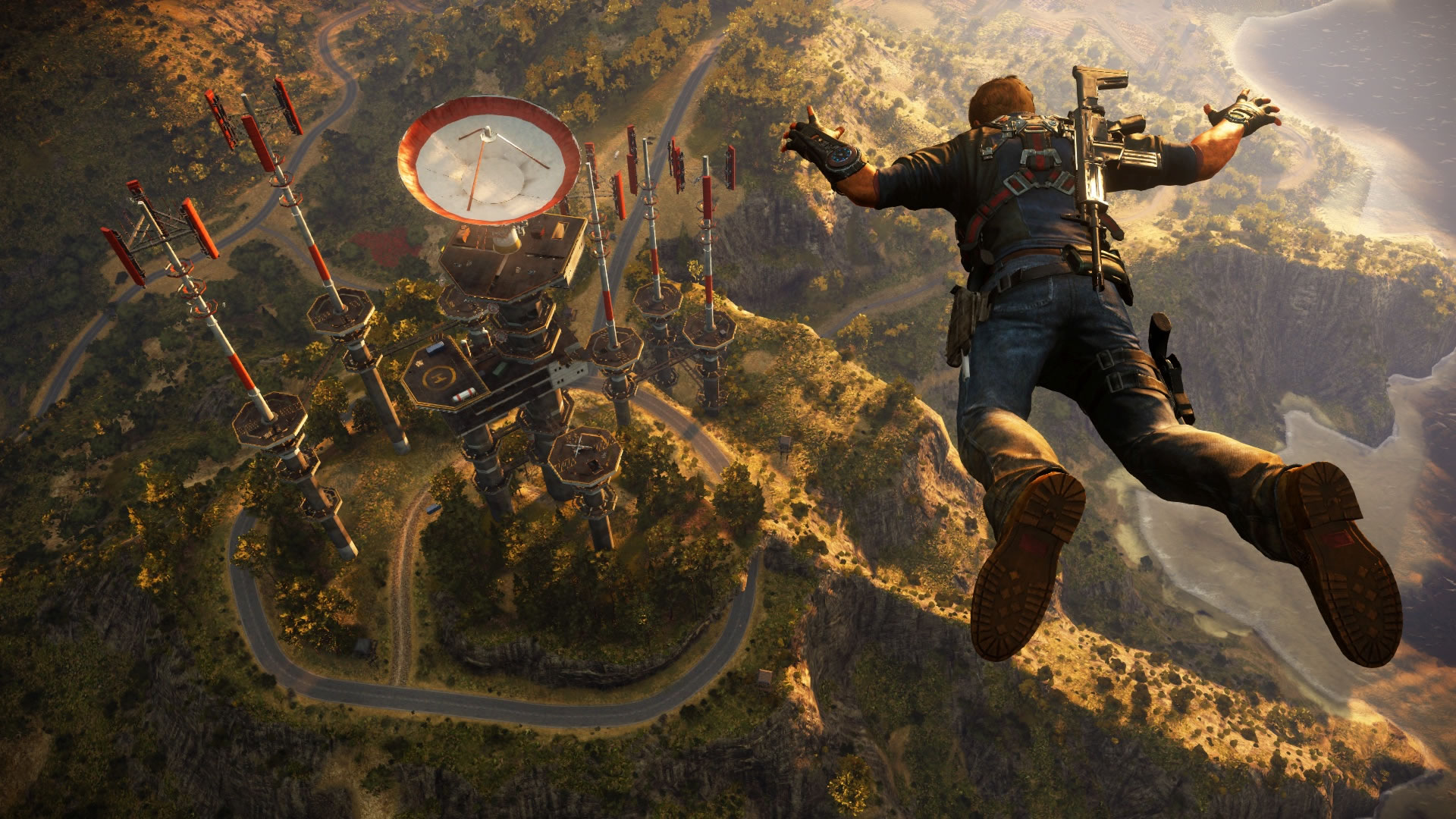
If you're wondering what that good thing is, check this out:
The new open-world game from Avalanche Studios captures the thrill of flight in a way that very few games manage. I'll whiz through a mountain pass and buzz oh-so-close to a clutch of pines, the sound of wind in my ears and a grin on my face. In those moments, it's possible to forgive Just Cause 3 its many shortcomings. In those moments, it's possible to forget I'm playing a deeply flawed game and revel in the things it does best. Leaping from the walls of a cliffside military base, detonating a remote explosive while catching the breeze under my wings, I'll say to myself, "Okay, this is a game I can recommend."
Then something or other would bring me crashing to the ground, and my estimation of Just Cause 3 would follow close behind. Argh, I would think. Arrrrrrgh. Can I really recommend something so strange and hobbled, so sloppy and frustrating and uneven?

Note: I'm leaning toward giving Just Cause 3 a heavily qualified Yes based on how fun the game can be, but I'm not comfortable doing so just yet, largely because the early PC build that I played had some significant performance problems. I run a 4GB GTX970 GPU and a 3.5Ghz Intel i7 CPU, and have been unable to maintain a steady frame-rate in full screen mode no matter what settings I tweak. Running the game in windowed mode helps things, but only a bit: My experience has been significantly hampered by bugs, visual glitches, and performance hitches, along with several hard crashes to desktop. Nvidia will no doubt release an optimized driver to coincide with Just Cause 3's retail release, but I don't know how much that'll improve things on the PC end. Meanwhile, I received a code for the PS4 version just today, so I can't yet authoritatively speak to how the game runs on consoles. Early technical performance reports from people who've played the console versions are troubling, however. Given how mixed I am on Just Cause 3 in general, I'm not comfortable recommending the game until I'm sure of whether the final version will work properly. Should the performance of the game improve through driver updates and patches, I'll update the review.
Just Cause 3 can be a very enjoyable game, as long as you're willing to overlook some glaring, maddening problems. The narrative is so undercooked it's raw, and the majority of the story missions are bad. Enemies are spammy and annoying, and enemy artificial intelligence feels dated and ridiculous. The game locks off too many basic upgrades behind repetitive side challenges, and too many of those upgrades are superfluous. It somehow manages to be irritatingly difficult and overly easy at the same time, and is frustrating as often as it is rewarding.
And yet... in spite of all of that...
When I'm a leaf on the wind, cooly skimming down the coast, I'm more than happy to set aside my gripes and live in the moment.
Just Cause 3 is an open-world explosion game a la Crackdown and Mercenaries, by which I mean it's set in a large open map and tasks the player with blowing up as much shit as possible. Picking up some time after 2010's Just Cause 2, it continues the story of special operative Rico Rodriguez, a likable despot-toppler who has returned to his home in a fictional Mediterranean archipelago called Medici. He plans to take down the dictator who's taken control in his absence.
Medici's enormous open map is divided into approximately seven hundred million different provinces (that's a guesstimate), and each province contains a handful of towns and military bases. At the start of the game, those towns and bases are all under the control of the evil General Di Ravello. It's your job to liberate them, which you accomplish by visiting each town or base and blowing stuff up until the game tells you you've conquered it. (Yes, this method of 'liberation' essentially has you bombing your own people in order to free them. This is, however, also a game where you can break a skydiving free-fall by firing a grappling hook straight down into the ground and reeling yourself in. It doesn't pay to think about any of it too hard.)

Each location you conquer turns from red to blue, and if you conquer all the locations in a given province, the province will turn blue. A collection of story missions guides you from the southernmost islands of Medici up to the large northern landmass, but as far as I can tell, you could actually just ignore all but the first few story missions and get right to the liberating. Having suffered through all 25 of those missions, I recommend that approach.
At the outset, Just Cause 3 seems set to tell a by-the-numbers tale of a guy who returns home to set things right. Something strange seems to have happened to this game in development, however. Everything pertaining to the narrative feels out of whack.
The supporting cast is appealing at a glance. The purposefully diverse collection of stereotype-busters might be an overly obvious course-correction from the is-this-racist-or-just-poorly-written cast of Just Cause 2, but remains a welcome improvement. Unfortunately, even the most interesting-seeming cast members are underdeveloped and flit in and out of the narrative with minimal impact. The villain is bland, and the story keeps hinting at a grand revelation regarding his relationship with Rico, but it never pays off. The script takes odd tonal detours, too. It's loaded with self-aware jokes about parachutes and rocket rodeos, but occasionally lapses into half-hearted melodrama. In the end, it just doesn't work.

Most of Rico's story is told during cutscenes that buffer a collection of impressively lousy story missions. Just Cause 3's story missions are bad on a level that simply doesn't jibe with how much care has gone into most of the rest of the game. The disconnect is striking. Each mission tends to run five to ten minutes, broken up by loading screens and odd non-interactive sequences. When Rico ramps a car into a transport jet as it takes off, you don't actually play the whole sequence, only the first part. The scene's culmination plays out in a very short cutscene, separated from the in-game stuff by pair of brief loading screens. It's a small---if jarring---thing in isolation, but happens often enough to ruin the game's flow. Almost every mission is like that; it all feels hastily thrown together and stapled onto the rest of the game.
One mission has you go and hijack a tank, then drive it down a road to a checkpoint. Another has you walk into a base, pull some levers, then pull some more levers, then leave. There are escort missions that are thin and annoying even by video game escort-mission standards. Several times the game had me follow some glowing pipes up a mountain, then enter a base and blow up three identical generators. Mission accomplished! Good job following those pipes, soldier. Each time the "mission complete" window popped up, I would chuckle and wonder if I was missing something.
The bummer story missions are all the stranger when placed alongside the rest of the game. For all its flaws, Just Cause 3 was clearly made with a great deal of care and love. It's often gorgeous and is beautiful in motion: the way the wind whips through Rico's clothes as he sails through the air; the shimmering of a city's lights when viewed from afar; the perfect orange moon, reflected in a twilight sea.

As you're lazily wafting over an evergreen forest atop Medici's snow-dusted northern island, the musical score will flip from castanets and flamenco riffs to wide open synths and yawning, celestial pads. It's in these moments that Just Cause 3 feels most carefully considered; less an arcade blow-em-up and more of a deliberate statement about beauty and flight, with precious little room for the half-baked dalliances that mar the main storyline.
This is a game about flying, and like many of the best flying games, your character can't actually fly. Woody the Cowboy said it best: Flying in Just Cause 3 is really just falling with style. That's crucial to how fun it is---if Rico could just Superman around, flying would simply be a matter of steering. Instead, flying requires just enough skill and finesse to feel really great once you get into the flow.
As in Just Cause 2, Rico is equipped with a grappling hook and a parachute that work well in tandem. Fire your grappling hook at something, reel in, then press the A button to open your chute. Whoosh!
That one-two combination worked well in Just Cause 2, allowing skilled players to gracefully flip, float, and grapple their way through enemy installations. Both the grappling hook and the parachute are significantly improved in Just Cause 3, and the second game feels arthritic by comparison.
In addition to the snappier grapple and a more maneuverable parachute, Just Cause 3 sets itself apart even further with a third, transformative new feature: Rico's wingsuit.
If you press the Y button in midair, Rico will pop out his winged squirrel suit, which immediately sets him gliding forward on an essentially unlimited supply of gentle updrafts. Just Cause 3's wingsuit is so well implemented and fun to use that it singlehandedly elevates the game.
Rare is the game where I hope the next waypoint is several miles from where I'm currently standing. It took me an hour or two of playing before I got my head around the mechanics of it all, but once I did, Just Cause 3's aerial traversal became the sort of video game interaction that lodges in the subconscious alongside Tony Hawk rail-grinds and Mario Kart power slides.
Just Cause 3's combat has been designed around the wingsuit and parachute. That makes sense, given that fast flight is the game's defining attribute. When Rico lands in a new enemy encampment, you'll have a brief period of time to start blowing things up before the guards notice you and attack. You can plant some C4 (happily, you have an unlimited supply) or maybe launch a rocket into a nearby power transformer. Once your assault is underway, swarms of enemies will begin shooting you, and they won't stop shooting you until you conquer the base.
You can try to play Just Cause 3 as a straight-up third-person shooter, but I don't recommend it. Aiming is imprecise even after you've unlocked precision targeting, and anytime I found myself standing on the ground and gunning down soldiers, I felt as though I was playing wrong. Soldiers never stop spawning, and will come at you from all sides, spraying you with bullets as you try to plant bombs and sabotage computer terminals. This makes a sort of sense---you're supposed to keep moving at all times, and as long as you do, most bullets won't really hurt you that much---but it can also feel spammy and aggravating.
When a base assault is going well, it's a hell of a lot of fun. You'll plant some bombs and grapple up into your wingsuit, pulling left and circling in the air while you detonate explosives below. But when something goes wrong---and this game is chaotic and sloppy enough that things frequently go wrong---it can be maddening. That's in large part because Rico can easily be staggered or knocked to the ground, which takes away the player's control and often forces you to sit through an extended ragdoll effect and recovery animation while enemies continue to peg Rico with bullets.
No one strategy works for very long. Your tank will explode within seconds, and your helicopters will almost immediately be shot down. This rewards improvisation but makes it difficult to plan and execute any sort of a deliberate strategy. I mostly wound up relying on the same approach for every base: Fly in, set bombs on things, keep moving, and eventually win.

As I gradually took over the southern part of the map, I started to notice some odd difficulty tuning. Just Cause 3 can often feel challenging, but rarely in a fair way---if you die, it's usually just because the brainless enemy hordes got lucky. In spite of that, it can also feel too easy. If you die in the midst of taking over an outpost, your progress on that outpost remains unchanged, and you can return to finish at your leisure. The alternative---having outposts reset upon death---would be far too punishing, but the current system makes the game too easy. With time and determination, you could hardnose your way through every outpost in the game without unlocking a single upgrade or weapon. Aside from a few tough late-game enemy vehicles, Just Cause 3 feels the same at the end as it did at the beginning.
The lack of a meaningful difficulty curve reveals Just Cause 3 to be an unexpectedly casual game. It's best viewed as a large, sprawling playset where you can screw around, pull off wild stunts, and see if you can capture footage of something cool enough to share with your friends on YouTube. You can challenge people on your friends list to outdo their scores, as well---who can glide the longest, who can grapple the farthest, etc. There weren't enough pre-release players to give me a sense of how that'll work in the finished game, so my appreciation of this option is mostly theoretical.
While slogging through the final half-dozen story missions, I was tilting extremely negative on Just Cause 3. Argh, I repeated to myself for the hundredth time. Arrrrrrgh. I wasn't having even an inch of fun. But once the story was over, I returned to the open world and set about liberating more outposts, unlocking more abilities, and casually experimenting with the game's many guns, bombs, and vehicles. I stopped groaning. Several hours later, I'd come all the way back around. Cool, I thought to myself. Coooooool.

I sense that the majority of players will approach Just Cause 3 casually, as something to dip into for quick bouts of mayhem. That's easily the most enjoyable way to play it, though it in some ways runs counter to the way we consider and evaluate this type of big-budget, big-publisher game. Just Cause 3 is too repetitive to be enjoyed for longer than an hour or so at a time and too annoying and random to reward obsessive play. Had I not been reviewing it, I likely wouldn't have felt compelled to finish the story at all, and having finished it, I now know that I wouldn't have been missing anything.
It isn't often that I genuinely wish a game were better. Most games are what they are, and for better or for worse, that's fine. After 25 hours with Just Cause 3, I find myself in the unusual position of actively wanting it to be a better game than it is. That's partly due to its enthusiastic, generous spirit, and partly due to how well it does what it does well. I wish Just Cause 3 could be the game it aims to be more consistently. I wish it lived up to the joy of its best mechanical ideas more often, and I wish it didn't feel so patched-together. I wish I'd spent a larger percentage of my time grinning in delight rather than grimacing in frustration.
I wish I had a Ferrari, too, I guess. I wish I had a dog. I wish a lot of things, but wishing does not make them so. Just Cause 3 can be plenty of fun, but despite its gorgeous world and brilliant mechanical centerpiece, it remains flawed enough to leave me wondering---and wishing---about what might've been.
